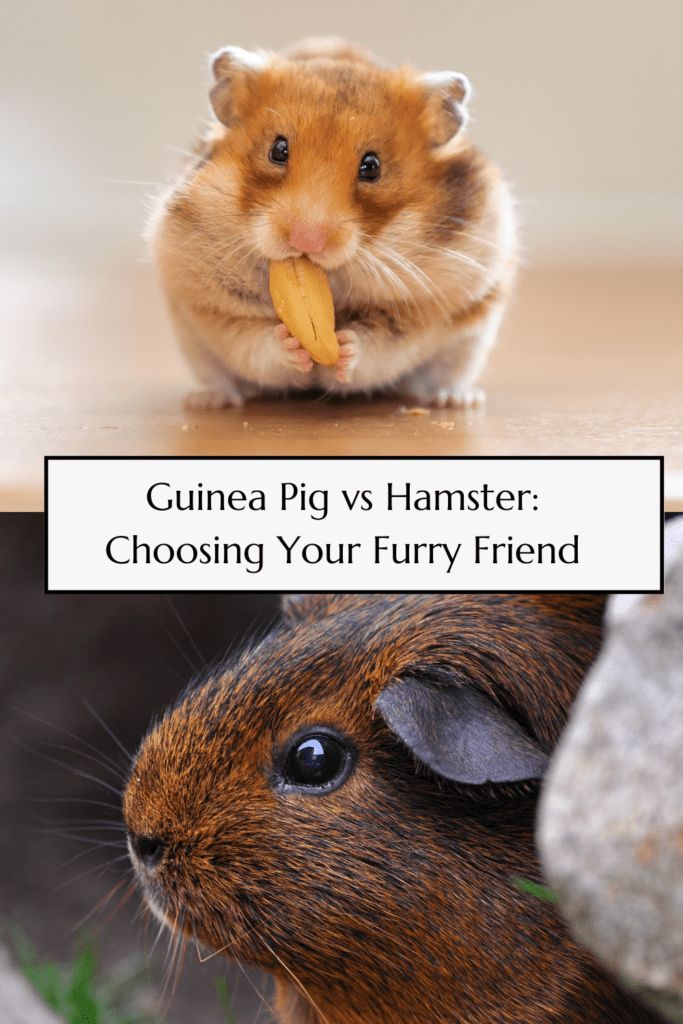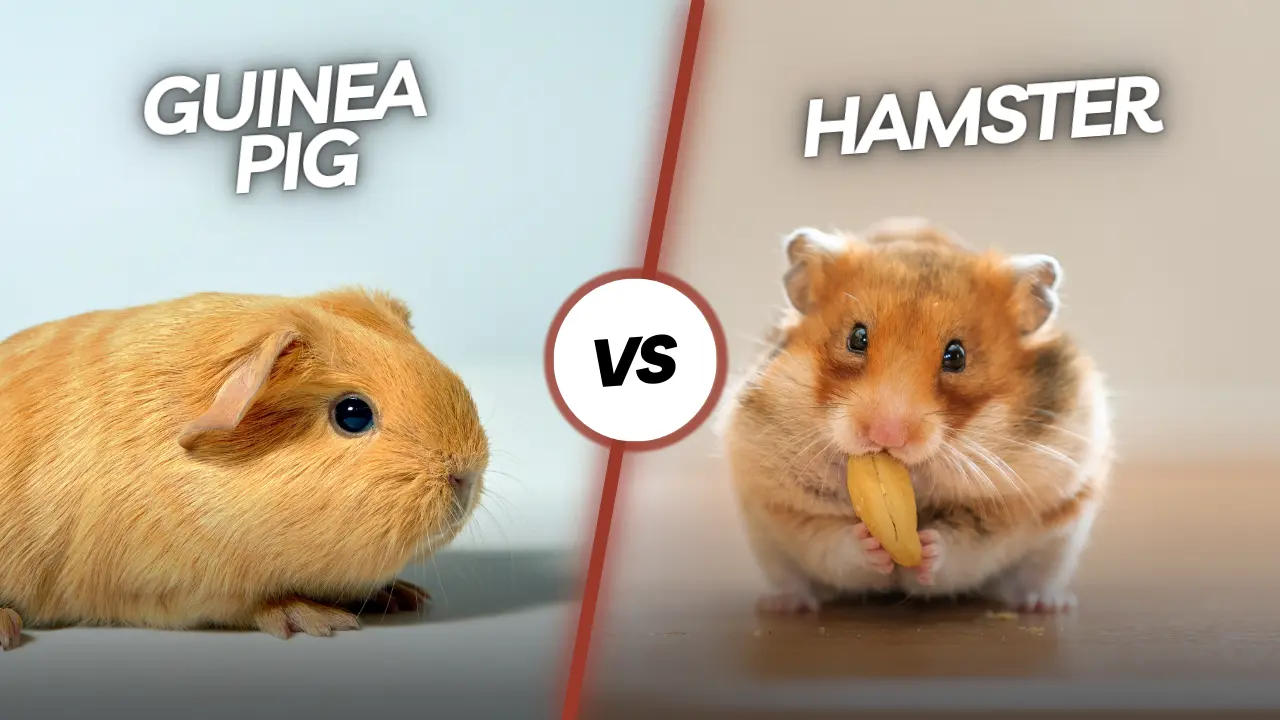
When it comes to choosing a furry companion, guinea pigs and hamsters are two delightful options that have captured the hearts of pet lovers worldwide. Both species offer unique characteristics and charm that make them popular choices for individuals and families alike. In this guide, we will explore the key differences between guinea pigs and hamsters, from their appearance and size to their intelligence and personalities. By understanding the distinct qualities of each, you can make an informed decision and welcome the perfect pet into your home. Now don’t get us wrong, there is no right or wrong answer here. Many people will LOVE both guinea pigs and hamsters. Just know that they don’t want to live in the same space. While a guinea pig cage will work as a hamster cage, these two animals should not live in the same enclosure. Two guinea pigs in one, sure. A guinea pig and a hamster, no.
Let’s settle the hamster vs guinea pig debate!
Guinea Pigs: The Social and Cuddly Companions
Appearance and Size
Guinea pigs, also known as “cavies,” are medium-sized rodents with a rounded body and short legs. They typically measure around 8 to 10 inches (20 to 25 centimeters) in length and weigh between 1.5 to 2.5 pounds (700 to 1200 grams). One of their defining features is their adorable and expressive faces, with large, round eyes and cute whiskers.
Personality
Guinea pigs are renowned for their friendly and sociable nature. They thrive on companionship and enjoy the company of both humans and fellow guinea pigs. These gentle rodents are often compared to “miniature lapdogs” due to their affectionate and cuddly demeanor. Guinea pigs are known to develop strong bonds with their owners, making them ideal pets for families seeking a close and interactive relationship.
Intelligence
While guinea pigs may not possess the problem-solving abilities of some other rodents, they are remarkably intelligent in their own right. They can learn to recognize their names, respond to familiar voices, and even pick up on certain cues from their owners. Their social intelligence also shines through in their interactions with other guinea pigs, as guinea pigs communicate through a range of vocalizations and body language.
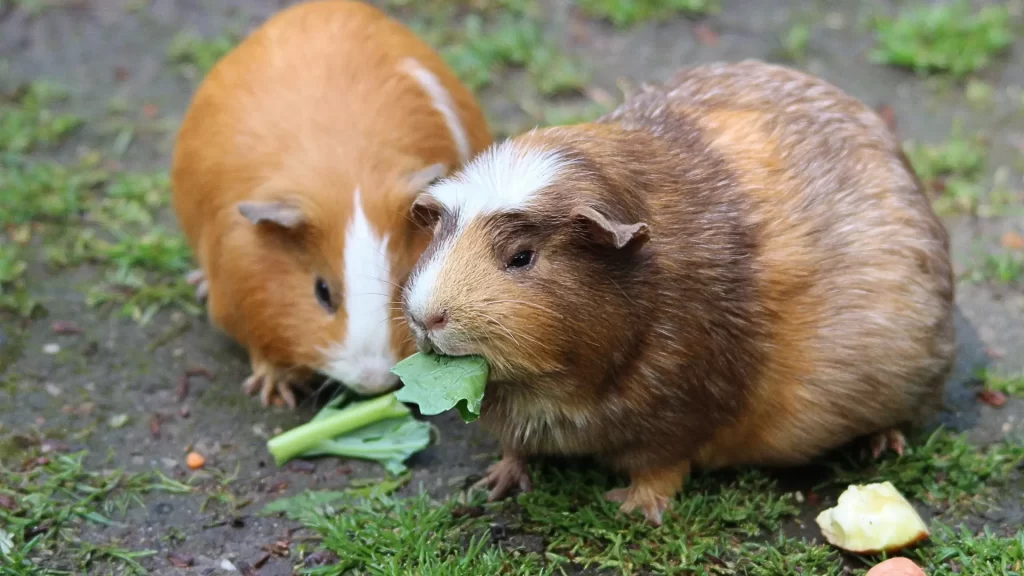
Pros of Guinea Pigs
1. Sociable and affectionate, making them excellent companions for families and individuals seeking a close bond.
2. Relatively low-maintenance pets that thrive with proper care and attention.
3. Gentle and friendly nature, making them great for households with children.
4. Social animals that benefit from having a cagemate, reducing loneliness and boredom.
5. Longer lifespan compared to hamsters, providing years of joy and companionship.
Cons of Guinea Pigs
1. Require a larger living space due to their size and social needs.
2. Need regular grooming to maintain their long fur and overall hygiene.
3. More prone to certain health issues, such as dental problems and vitamin C deficiency (scurvy).
4. May be more expensive to care for due to their larger size and specific dietary requirements.
5. While sociable, some guinea pigs may exhibit territorial behavior when introduced to new cage mates.

Hamsters: The Energetic and Curious Explorers
Appearance and Size
Hamsters are small, adorable rodents with round bodies, short legs, and cute, twitching noses. Their size varies depending on the species, but on average, they measure around 4 to 7 inches (10 to 18 centimeters) in length and weigh between 1 to 7 ounces (28 to 200 grams). Despite their small stature, hamsters pack a big personality.
Personality
Hamsters are known for their curious and energetic nature. These little explorers love to scurry around, investigating their surroundings and creating elaborate burrows in their cages. While they may not be as cuddly as guinea pigs, they enjoy interactive play and can develop strong bonds with their owners through regular handling and care.
Intelligence
Hamsters are clever creatures, and their curiosity drives them to find creative solutions to everyday challenges. They are skilled escape artists and can be quite resourceful when it comes to navigating their habitat. Providing them with stimulating toys and enrichment activities is essential to keep their active minds engaged.
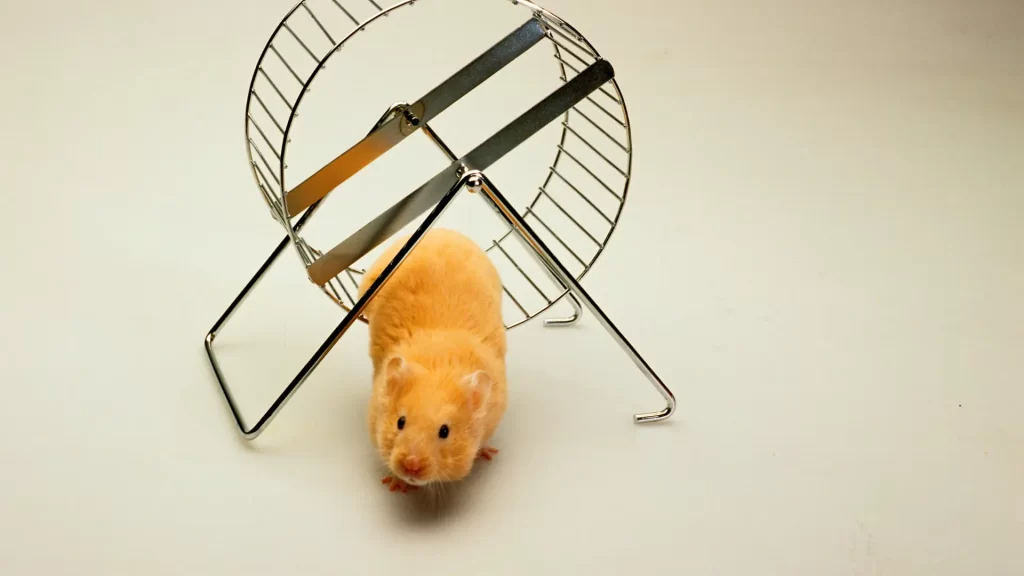
Pros of Hamsters
1. Smaller size and lower maintenance needs, making them ideal for individuals with limited space.
2. Enthusiastic and entertaining personalities, bringing joy and laughter to their owners.
3. More independent and less reliant on constant social interaction, suiting those with busy schedules.
4. Easier to handle and less prone to territorial behavior when introduced to new cage mates.
Cons of Hamsters
1. Less cuddly and affectionate compared to guinea pigs, better suited for individuals who enjoy interactive play.
2. Nocturnal creatures, which means they are most active during the night and may disturb light sleepers with hours of running on their wheel haha.
3. Some species can be prone to nipping or biting when startled or stressed.
4. Not as social as guinea pigs, which means they may prefer solitude rather than constant interaction.
5. Smaller size may make them more challenging to handle, especially for young children.
More Comparisons Between Guinea Pigs And Hamsters
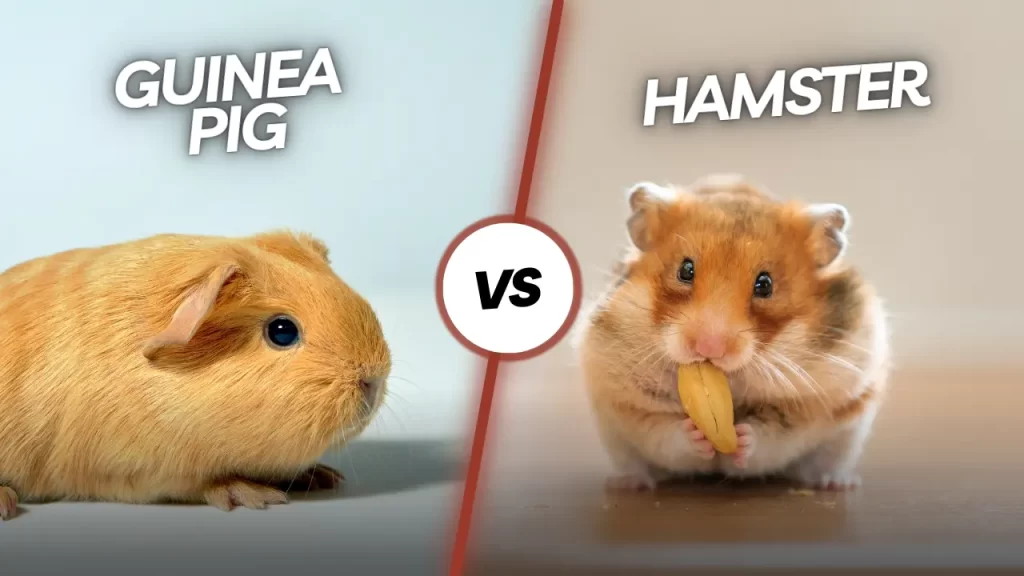
Living Space and Habitat
Guinea pigs require a larger living space due to their size and social needs. A cage with at least 7.5 square feet of space per guinea pig is recommended, and they benefit from having a cagemate to reduce loneliness and boredom.
Hamsters, being smaller and more solitary in nature, can thrive in a smaller habitat. A cage with at least 360 square inches of floor space is suitable for a single hamster. However, if you plan to keep multiple hamsters, it is crucial to provide separate enclosures to avoid territorial disputes.
Grooming
Guinea pigs have longer fur that requires regular grooming to maintain its cleanliness and prevent tangling. Regular brushing is essential to keep their coat healthy and free of mats. Additionally, guinea pigs do not groom themselves as extensively as other rodents, so they may need occasional baths to stay clean.
Hamsters, on the other hand, have shorter fur and are meticulous self-groomers. They clean themselves by licking their fur, which helps maintain their coat in good condition. As a result, hamsters generally do not require regular grooming from their owners.
Social Needs
Guinea pigs are social animals and thrive on the companionship of other guinea pigs. They should ideally be kept in pairs or small groups to satisfy their need for interaction and play. When housed together, guinea pigs often display affectionate behaviors, such as grooming each other and cuddling.
Hamsters, on the other hand, are more solitary by nature. While some dwarf hamster species can tolerate living with a cagemate, most hamsters prefer to live alone to avoid territorial conflicts. Attempting to keep multiple hamsters in the same enclosure can lead to aggressive behavior and stress.
Lifespan
Guinea pigs generally have a longer lifespan compared to hamsters. Guinea pigs can live anywhere from 5 to 7 years, depending on their care and genetics. In contrast, hamsters have a shorter lifespan, ranging from 2 to 3 years on average.
Handling
Guinea pigs are typically easy to handle and enjoy human interaction. They may be nervous initially, but with gentle and regular handling, they quickly become accustomed to being held and cuddled.
Hamsters, while also amenable to handling, may require more patience and gentleness, especially if they are not used to being held. Properly socializing a hamster from a young age can help them become more comfortable with human interaction.
Noise Level
Both guinea pigs and hamsters are relatively quiet pets, but guinea pigs are generally more vocal. Guinea pigs communicate through a variety of sounds, including squeaks, purrs, and chirps, which they use to express their emotions and needs.
Hamsters are less vocal, and while they can produce some soft noises, such as squeaks or chirps, they are generally quieter than guinea pigs.
In the delightful world of small pets, both guinea pigs and hamsters shine with their unique qualities and charms. Guinea pigs offer unmatched cuddliness and sociability, forming deep connections with their owners and fellow guinea pigs. On the other hand, hamsters enchant with their boundless energy and inquisitive nature, providing endless entertainment and exploration.
Ultimately, the decision between a guinea pig vs hamster comes down to your lifestyle, preferences, and ability to meet their specific needs. Whichever furry friend you choose, you are sure to embark on a delightful journey filled with love, laughter, and companionship. With proper care and attention, both guinea pigs and hamsters make for heartwarming and entertaining additions to any family or individual seeking the joy of a furry companion.
